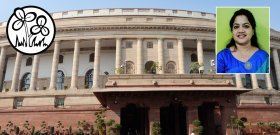August 2, 2024
Sharmila Sarkar’s speech during the discussion and voting on the demands for grants under the control of the Ministry of Health and Family Welfare for 2024-25

Thank you, hon. Chairperson, Madam. On behalf of All India Trinamool Congress, I rise to speak on the Demand for Grants under the control of the Ministry of Health and Family Welfare for the year 2024-25. But before I start, I would like to raise my voice on behalf of the AITC that the GST should be removed from life insurance and medical insurance as early as possible. And if the Finance Minister is unable to do so, then we have to protest against it in very large scale. First of all, what is health? If we go by the definition of WHO, it is a state of complete physical, mental, and social well-being, not merely the absence of disease or infirmity. That means, to have an effective healthcare system, we have to think not only of treating the physical illness, but we have to also address the mental illness and prevention of the disease. ‘Health is wealth’ is timeless truth. It has been known since our childhood. As we aspire for Viksit Bharat by 2047, can we achieve this without taking health into account? Although the allocation for the Ministry of Health and Family Welfare has risen from Rs. 80,000 crore to Rs. 90,000 crore, the current funding is still too low to meet the country’s health need. The National Health Policy of India 2017 aims to raise public health spending to at least 2.5 per cent of GDP by 2025 to improve the healthcare system. However, the current Budget allocates only 2.1 per cent. This is inadequate for strengthening the primary healthcare and improving the national health programme. There is an imperative need for dedicated funding for mental health services, including indoor and rehabilitation facilities, counselling, community-based programmes, as well as investment in public awareness campaigns to reduce stigma associated with mental disorder and to promote mental health. Throughout India, several Central Government health programmes are encountering significant difficulties. The allocation for Pradhan Mantri Ayushman Bharat Health Infrastructure Mission has decreased from Rs. 4,200 crore to Rs. 3,200 crore. That means, Rs. 1,000 crore has been decreased. In this context, on behalf of the people of West Bengal, including those in my constituency, I would like to express my heartfelt thanks to Shrimati Mamata Banerjee, our Chief Minister, for introducing the benevolent Swasthya Sathi Scheme back in 2016. This was well before the introduction of the Ayushman Bharat Scheme in 2018 by the hon. Pradhan Mantri. The Swasthya Sathi Scheme provides benefits of up to Rs. 5 lakh per family per year to all residents of West Bengal regardless of caste or socio-economic status. Coming to the Pradhan Mantri Swasthya Suraksha Yojana, there is a big dip in its allocation from Rs. 3,365 crore to Rs. 2,200 crore. The primary aim of the project is establishing and upgrading new AIIMS and district hospitals. But if we see the condition of AIIMS, it is horrible. If you want to increase the number of AIIMS, then you have to maintain the standard comparable to AIIMS, New Delhi. We all know that AIIMS, New Delhi is our pride, but we have to think that if I use the name of AIIMS, then we have to maintain a minimum standard for it. AIIMS, Kalyani is struggling with several issues like incomplete infrastructure, equipment shortages, and construction delays. The absence of over 100 qualified doctors is critically affecting both medical education and patient care. I would like to draw your kind attention to the fact that more than twothird of India’s population resides in villages. So, it is critical to prioritize strengthening of primary healthcare system. Here, we should establish a few model Primary Health Centres for additional specialized services such as optometry, diabetic care, basic cardiological screening, geriatric care and psychological counselling. I urge you to take up this matter seriously. Training for ASHA, Anganwadi workers and Community Health Officers is crucial because disease screening is vital in any programme. The success of telemedicine largely depends on the CHO. The ASHA and Anganwadi workers are overburdened and they are poorly paid. The Government should increase their remuneration. I had to say so many things, but you are not permitting. It would be beneficial to include more essential drugs under the DPCO to better support the common people and middle-class families. As regards reducing the cost of three anti-cancer drugs that are rarely used, it is so costly that even with upper exemption limit it will not be affordable for the poor people. Protecting doctors from violence is an urgent priority. The Government should consider installing CCTVs and recruiting additional security personnel, which is the need of the hour. All of you know that there has been a notable increase in digital services and online consultation, especially during the COVID-19 outbreak. But the National Digital Health Mission did not receive any additional funds in this Budget. The Tele-MANAS is also being neglected by this Government. The mental disorder is 10.6 per cent and there is a treatment gap of 70 to 90 per cent. So, the Government should think to keep Tele-MANAS on priority and more psychiatrists and psychologists should be trained under the mental healthcare project. The National Immunization Programme, the National AIDS Control Programme, etc. are all suffering. The Government should think about all of them seriously. मैंआपके माध्यम सेमाननीय हेलथ और फाइनैंस कमकनस्टसुजी को बोलना चाहती ह ं कक गरीब और गांवों मेंरहनेवालेलोगों को सही रीटमेंट नहीं कमल पा रहा ह, ै उन पर आप ध्यान दीकजए। इसके कलए आप फण्ि को बढ़ाइए। आपका फण्ि केवल एम्स, कदलली और कवमहेंस के कलए नहीं है। आपराज्यों केगरीबों केबारेमेंभी सोकचए। धन्यवाद।
